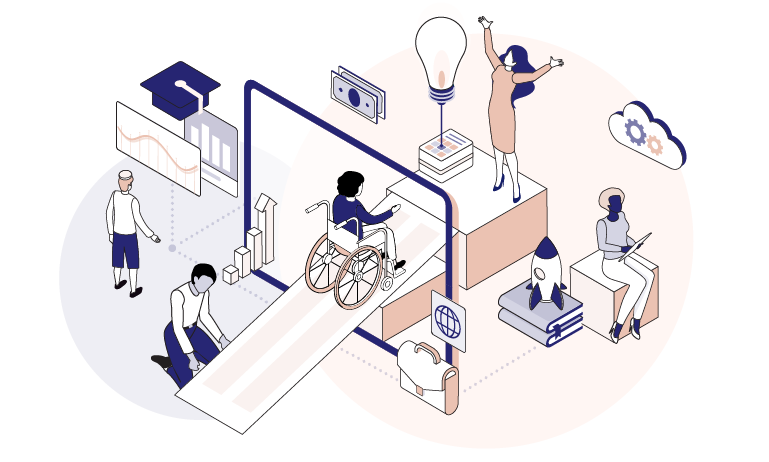As stated in the latest OECD report on “The Missing Entrepreneurs 2019 – Policies for inclusive entrepreneurship”, digital entrepreneurship – the creation of digital businesses and the adoption of digital technologies by existing entrepreneurs – may hold potential to make entrepreneurship more inclusive.
Underrepresented population groups in entrepreneurship might be more likely to benefit from certain features of digital technologies for business creation and growth, including lower start-up costs required for digital businesses and wider access to external markets offered by the internet. However, international surveys (Eurostat, Labour Force Survey, 2019) indicate that women, immigrants, youth and seniors are significantly underrepresented among digital entrepreneurs in the EU.
Barriers to digital entrepreneurship in 2021
Gaps in entrepreneur profiles are caused by factors such as the absence of role models in digital entrepreneurship and the lack of digital skills. Data on computer usage clearly show that women, seniors and youth groups have gaps in basic digital capabilities. Moreover, recent studies have demonstrated that many barriers to business start-ups (e.g. poor skills, access to finance, inefficient networks) are being transferred to the digital economy increasing the obstacles in business financing and networking.
Therefore, the policy recommendations outline the need for actions that tackle barriers to digital entrepreneurship through schemes that help build digital and entrepreneurship skills across education, training programmes and facilitating peer-to-peer learning.
The objectives of the “Missing Entrepreneurs” initiative
The Missing Entrepreneurs Project goal is to promote a more inclusive culture towards digital start-ups and encourage the development of digital and entrepreneurship competences among vulnerable and underrepresented groups in this field.

In order to carry out this project, a set of specific targets and actions have been established:
- Develop a complete framework of digital skill gaps of underrepresented population groups in digital entrepreneurship. The study will be carried out in participating countries (France, Portugal, Spain, Italy, Cyprus, and Austria) and on the European level, allowing to identify common trends.
- Create an educational and awareness campaign to eliminate the stereotype around digital entrepreneurs being young men, by presenting real examples and success stories.
- Launch of the European Academy on Inclusive Digital Entrepreneurship to create a training for up to 180 people from under-represented groups. This academy consists of:
- Extensive database of online training courses that leverages all available e-learning resources on entrepreneurships and digital skills
- Practical training modules and “training pills” on digital tools available for digital entrepreneurship and digital transformation of businesses.
Amaris Consulting’s role in the project
Amaris is the coordinator of the project monitoring the overall progress of the program, providing its expertise in project management and digital technologies.
Amaris will lead the development of Training modules on practical online tools for digital entrepreneurship and digital transformation of businesses, as well as co-lead the Development of the e-learning database on entrepreneurship.
You want to learn more about our digital capabilities? Discover our Information Systems & Digital solutions.
Primary target audiences
- Underrepresented population groups in digital entrepreneurship such as women, immigrants, youth, seniors;
- Representatives of adult education centres and schools, as well as related associations and networks;
- Youth organisations representatives;
- ONGs working in the field of professional development and labour market participation of women, immigrants, youth and seniors;
- Association and communities of entrepreneurs, digital businesses as well as social inclusion of women, immigrants, youth and seniors;
- Schools and training associations;
- Higher education such as universities with curriculums related to entrepreneurship, business transformation, online marketing, e-commerce etc;
- Start-up’s incubators – Entrepreneurship and digital transformation professionals – career counsellors and employment offices;
- Media: online platforms and groups related to the entrepreneurship, digital skills, digital business, innovation, social inclusion, etc.
Project details
| Project title | The Missing Entrepreneurs – Promoting capacity building of Missing Entrepreneurs for inclusive digital entrepreneurship and digital transformation of businesses |
| Project ID | 2020-1-FR01-KA204-080632 |
| Project website | https://themissingentrepreneurs.eu |
| Project duration | 11/2020 – 10/2022 |
| Co-funding body | European Union, French National Agency |
| Co-funding Programme | Erasmus+ Programme |
| Project partners | P0 – Amaris France SAS (France) – Coordinator P1 – Associação Portuguesa de Startup (Portugal) P2 – Blue Room Innovation (Spain) P3 – Center for Social Innovation (Cyprus) P4 – EGInA(Italy) P5 – die Berater (Austria) Supporting organization: OCDE |
The Missing Entrepreneurs: “Promoting capacity building of Missing Entrepreneurs for inclusive digital entrepreneurship and digital transformation of businesses”
(2020-1-FR01-KA204-080632).



